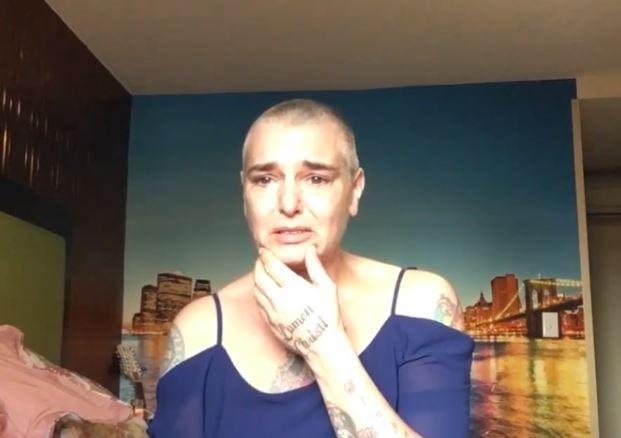Sinead O’Connor’s video this week stripped away all the middle class worthiness surrounding conversations about mental health
When I saw the video, my thoughts went back to laughing and joking with Sinead on a beach in California more than 20 years ago, to hugging her in a television studio in Dublin not that long ago, to a brief stint living in a hotel room as her manager succumbed to bladder cancer


A mental health condition isn’t comfortable to be around. It affects everyone close to the person, in ways that take years to heal. Often, people who are affected talk about their condition in the past tense: something they struggled with, a period in their lives that was tough but they came through it.
In reality, many forms of mental health issue (just like addiction) never go far away, although there might be times when they seem easier to control.
This week, a brave video posted online by Sinead O’Connor offered a raw insight into the daily battle to control inner demons. Filmed in her hotel room in New Jersey, the weeping singer sobbed to the camera: “My entire life is revolving around not dying, and that’s not living.”
I choked; my thoughts went back to laughing and joking with Sinead on a beach in California more than 20 years ago, to hugging her in a television studio in Dublin not that long ago, reading reports of a life increasingly troubled. We met in 1990, when my friend became Sinead’s manager and she recorded Prince’s "Nothing Compares 2 U", becoming an international star with a highly acclaimed second album. Steve Fargnoli (who previously managed Prince) became like her father and best friend, a charming and tolerant man.
Sinead was utterly unpredictable, enchanting, annoying and special, extraordinary in concert. When Steve was dying with bladder cancer in 2001, we moved into his hotel in Los Angeles for his final days.
In 2003, Sinead was diagnosed with bipolar disorder, but she’s since stated that she suffers from depression and post-traumatic stress. Whatever the medical definition of her condition, this video sets out her suffering, posted (she says) to show what life is like for millions living with the same misery. She cries out: “Mental illness, it’s like drugs, it doesn’t give a shit who you are, it’s the stigma... I’m invisible, I don’t matter a shred to anyone.”
In the last few weeks, the Royal princes have been campaigning to encourage young people to discuss their feelings and seek help if necessary. The anniversary of the death of Princess Diana has seen documentary after documentary focusing on her mental health issues, from eating disorders to narcissism. By posting this unflinching video, Sinead strips away all the glitz and glamour and middle class worthiness from any conversation about mental illness – you are confronted with the sheer awfulness.
Campaigns that encourage discussion are well-meaning, but helping those affected to receive the right treatment is another. Recently, a High Court Judge used shocking language to express his utter disgust at the lack of mental health provision for young people in the UK, describing it as “an outrage”, writing he could not believe that one of the richest countries in the world was unable to spend enough to help the young people who are our future.
The girl this judge was trying to help place in a low-security mental health unit was referred to as X in court. In serious danger of killing herself, X was being kept in a bare room with nothing, except a mattress.
Currently, there are only 1,459 NHS mental health inpatient beds for young people in England, of which just 124 are in low-security units – at a time when suicide is the biggest cause of death among young men. Patients can wait up to six months for a bed in an appropriate unit – can you imagine the impact that must have on a teenager with suicidal thoughts?
The Government has pledged funding for 180 extra beds for children and young people – just a drop in the ocean, considering that prescriptions for antidepressants have doubled in the last 10 years. For all the promises of talking therapies and providing more counselling, waiting for NHS mental health assessment before you can receive any treatment takes months rather than weeks, and there is a severe shortage of counsellors.
The anguish of Sinead O’Connor highlights the uncomfortable truth: mental illness isn’t something that can just be smoothed away with pills or kind words; it is with sufferers for their entire lives. Sinead is now receiving treatment in the US, but all over the country, there will be people exactly like her struggling without any support, relying only on over-prescribed medication when what they need is a carefully managed care plan. Let’s hear it for Sinead.

Join our commenting forum
Join thought-provoking conversations, follow other Independent readers and see their replies